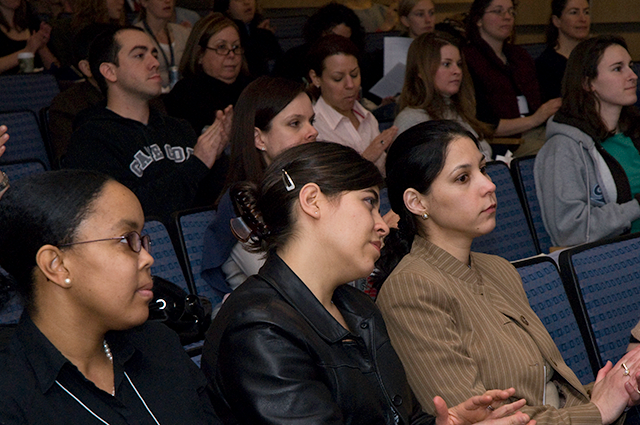Seminar Series Tackles Difficult Conversations

When the Tufts Health Sciences Campus shut down in March, Neuroscience PhD Candidate Sadi Quiñones and his advisor (and Neuroscience Program Director) Chris Dulla were in the middle of planning a year-long seminar series. Quiñones had recently been awarded the Howard Hughes Medical Institute’s Gilliam Fellowship for Advanced Study, a three-year grant designed to increase diversity in the biomedical sciences.
“[Before the shutdown] we thought a seminar series would be a good idea,” Quiñones said. “At the time we were focused on academic talks, finding professors from under-represented groups (URGs) to help students find their identity by seeing people from their groups in STEM. But when things started to shut down – and then as so much racial tension was brought to the surface – that’s when we knew we needed a space where individuals can be heard, where we can have frank and open conversations about racism in academia.”
Quiñones and Dulla’s discussions of the topic led to the creation of an ongoing seminar series explicitly addressing racism in STEM fields. The series – called “Let’s Talk About Racism: Academia, Accountability, and A Way Forward” – features speakers from medicine and biomedical sciences, as well as those who study the intersection of race and education. It is funded by the Gilliam Fellowship, the Neuroscience program, and the Tufts IRACDA program.
“One reason we thought this would be a good idea,” said Dulla, “was that our program made a lot of progress toward better representation in our seminar series. We thought we could build on that, and show that there are plenty of great scientists from all backgrounds doing amazing work. Since we were coming from that place, it allowed us to layer on the component of talking head-on about racism in academia.”
Quiñones and Dulla both see the seminar series as a complement to Tufts’ current initiatives in Diversity, Equity, and Inclusion. “There’s so much work being done already at the administrative level,” Quiñones said. “There are a lot of changes taking place structurally, but ultimately you need a culture shift, and the culture is made up of individuals. We saw this is a way to tackle that culture shift. We can change rules, we can change guidelines, but if the culture doesn’t change, drastic changes are impossible.” Dulla also mentioned the importance of the series’ visibility: “Institutional work isn’t always visible at first, so this was a way to be visible, to have conversations and email flyers and post on Twitter and say, ‘this is meaningful’.”
Putting together a seminar series while observing social distancing guidelines has been a challenge, but one that both Quiñones and Dulla have found to be rewarding. “The con is that, in-person, you have a greater sense of community,” Quiñones said. “But the pros heavily outweigh the cons. For the first seminar, I was expecting 15 or 20 people, and we ended up with 80 or 90 in attendance! It’s a lot easier for someone to click a button a join a Zoom meeting from their living room or while they’re playing with their kids.” Dulla agreed, noting that attendees came from all throughout the Tufts community: “People came from the Medford campus as well as Boston, from all across the medical school. We had students of all levels, administrators, and faculty. It’s really been a great cross-section of people.”
Quiñones also thinks the virtual format has helped with the frank conversations he and Dulla envisioned as part of the series. “These are difficult conversations. Even with our video on and our names onscreen, there’s a bit of a comfort blanket in not being in-person; you don’t have to raise your hand to ask a question you’re maybe not comfortable asking, and it seems like people are saying things they wouldn’t normally have said.”
Dulla added that the remote format has allowed for a high-quality seminar series. “We’ve gotten great speakers from all over who we wouldn’t necessarily have had the funds to fly in and put up in a hotel. It’s leveled the playing field; there’s almost no barrier to having people give talks.” He also emphasized that speakers are paid an honorarium, saying, “It’s an issue right now that many people who are doing this work feel it’s unfair for them not to be compensated. We want to make sure we compensate them.”
In addition to the seminar series, Quiñones and Dulla have planned other events with the Gilliam funds. They recently hosted a socially-distanced cultural dinner that allowed students to learn about others’ culture in an informal setting. The first dinner – which was originally planned as an in-person event in April – featured individually packaged Puerto Rican meals from Boston mainstay Vejigantes, either picked up by or delivered to registered students, and a Zoom conversation about Latin American and Caribbean culture.
“It’s a chance to showcase someone else’s culture and what’s cool about it, to come together over food – everyone loves to eat good food! – and get a more personal experience of someone else’s culture than you might normally,” said Dulla.
Together, Dulla and Quiñones are also working on other initiatives, such as a cultural climate survey in the Neuroscience program and working with colleagues in other schools to start a SACNAS chapter at Tufts. Really, though, they’re open to opportunities.
“You always spitball and have things on the back burner,” Quiñones said, “and it’s really about finding the right opportunity and timing for those events, to make sure we’re maximizing their effectiveness.” The Gilliam fellowship – and an accompanying pledge from the Neuroscience department to match the funds – provided such an opportunity.
“Having the funds and having the Fellowship forced us to take this on, and it’s been really cool and rewarding,” said Dulla. “I hope that these programs and events will live on beyond the Gilliam Fellowship, which is three years. We’re really trying to figure out things that are sustainable.”